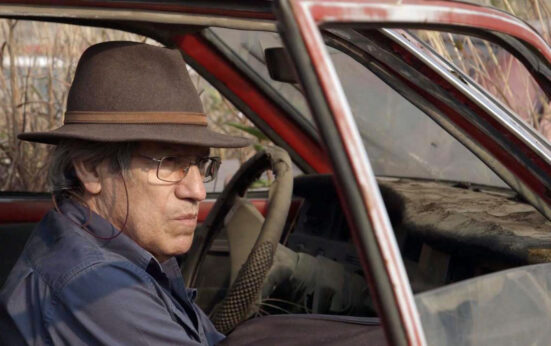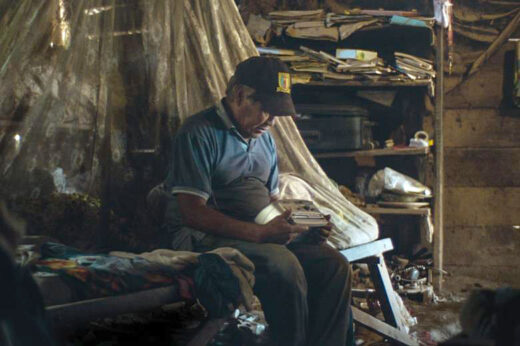The country’s largest documentary film festival, DOC NYC, is ready to begin its 2021 edition from November 10-18 in-person and online at www.docnyc.net. This 12th year of DOC NYC has a wealth of relevant films for progressive viewers. Some of the highly recommended docs that have been reviewed previously in these pages include Listening to Kenny G about how we listen to and define music as good or bad, Attica, a revisit to the tragic 1972 prisoner uprising, Summer of Soul (…Or When the Revolution Could Not Be Televised) featuring the less publicized “Black” Woodstock, and Option Zero, the saga of Cubans stuck on their way to what they thought would be a better life in America.

Other rewarding films that show promise include A Song for Cesar: Beware a Movement That Sings how music helped drive the migrant farmworkers’ struggles; The Real Charlie Chaplin offering a different view of the well-known progressive; The Gig Is Up examining the continual struggle of workers at new consumer industries; Refuge, where a Muslim and skinhead address hatred face-to-face; Silence of the Mole honoring an investigative journalist in Guatemala; and Sing, Freetown honoring an investigative journalist in Sierra Leone. This is just a taste of stimulating and thought-provoking fare that has been the standard at this increasingly important film festival.
Of the films I’ve been able to see, The Photograph is a stunning visual feast of the 1930s New York Harlem Renaissance featuring the work of acclaimed photographer James Van Der Zee and the world around him. Film: The Living Record of Our Memory pays admirable respect to the artists in the field of film restoration. Three excellent docs on China help viewers to better understand the people that our country is quickly demonizing. Already an award winner, Ascension examines a capitalist economy in a socialist system. Go Through the Dark follows an amazing blind 8-year-old boy who is already a genius at the ancient Chinese board game of Go. And After the Rain follows two families who each lost a daughter named Rain, after the 2008 Sichuan earthquake that flattened their elementary school—two human interest stories that offer an opportunity to empathize with the Chinese people.

The latest from Julia Bacha (Budrus) is a deep study of the growing BDS movement against Israeli apartheid and the attempt to stop the worldwide movement in support of the Palestinian people. Boycott follows three of the 22 anti-BDS lawsuits in the U.S. and the resulting appeals that fight to protect freedom of speech. Nothing But the Sun is a mesmerizing exposé of white colonialism and the violent uprooting of the native Ayoreo people of Paraguay by white missionaries told directly and honestly from the mouths of the native people themselves. They say their community “resembles a cut tree dying in the forest.”
White Cube, a film from the Netherlands, ends up being one of the more revolutionary films at the festival, examining the exploitation of workers in the Democratic Republic of the Congo through the study of how art relates to capital. The story follows a seemingly naive Dutch artist, Renzo Martens, who wears white shirts and dress pants while trampling through the jungle with “the natives” giving off the glaring impression of a white man coming to save the natives. He brings art supplies to a starving community that really needs food, medicine, and shelter before they need a paintbrush and colors.
But he’s aware that multinationals are exploiting the cheap labor and resources while little if nothing goes to the community. William Lever, capitalist and colonizer, extracts palm oil with cheap labor to make beauty products for the West. One main company is Unilever, creating an industrial empire, exploiting the people, and stealing land resources.
At the same time, Martens realizes that his earlier film Enjoy Poverty created wealth for the filmmakers but little for the communities that were featured in the film. His dream is to create art with the locals, sell it on the capitalist market to rich art patrons, and use the profits to build an art center and museum in the middle of the jungle for the people to display their art culture. People are participating because they are totally astonished by the amount of wealth spent on the project of getting natives to paint pictures and make clay statues. But the moment of truth arrives when the villagers tell him, “we need food, we need money—not pictures.”
Eventually, Martens is challenged by the Unilever company and prevented from filming there, so he comes up with a clever scheme to teach the villagers how to sculpt art out of chocolate, send it to New York, and sell it for large sums of money that go into building a giant white cube museum in the middle of the jungle. There’s lots more to the story that addresses the role of art in fighting poverty and capitalism—another rewarding and evocative experience for us progressive viewers.










